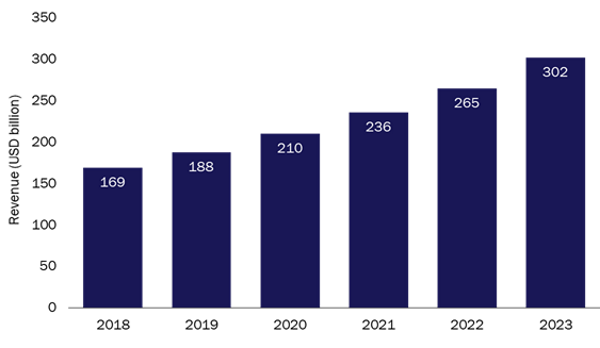The MSP landscape: the importance of MSPs is increasing as IT systems get more complex

Worldwide managed service provider (MSP) revenue is already almost USD170 billion, and this is expected to grow by 12% each year for the next 5 years (Figure 1). The market for MSPs is also changing rapidly; the same trends that are driving organisations to outsource IT services to MSPs (increases in technology complexity and security risk and the need to reduce costs) are affecting the MSPs themselves. To provide support for their customers, MSPs either need to scale up (often through M&A), outsource more of their own services, or both.
This article explores the services that are typically offered by an MSP. An overview of the main types of players that are interested in the MSP market (including specialist vendors, telecoms operators and network vendors) and their possible future involvement in this area is provided in a separate article.
Figure 1: MSP revenue, worldwide, 2018–2023
 Source: Analysys Mason, 2019
Source: Analysys Mason, 2019
The term ‘managed service provider’ has no fixed definition, but we think of MSPs as external providers of IT support for their clients. Typically, MSPs will charge on a fixed, per-seat basis, and the fees will depend upon the number of products or services supplied. MSPs therefore have fixed revenue streams and a strong incentive to resolve problems efficiently (or, even better, to avoid them in the first place). This is different from the traditional break/fix model in which providers are paid for each problem that they fix, and incentives are not necessarily aligned with the customer.
The products offered by an MSP typically include the following.
- IT helpdesk. This is a first line of support for problems with PCs, printers, servers, local area networks and software.
- Remote monitoring and management. MSPs will remotely monitor and manage their customers’ PCs and servers to monitor performance, manage updates (for example, software patches) and fix problems when they occur.
- Security. Security solutions will vary, and some MSPs have a wide security portfolio. Basic products include endpoint protection and firewalls. Security is seen as a significant revenue growth opportunity for MSPs.
- Back-up and disaster recovery. This involves the automatic back-up of data and its restoration, from all devices (such as PCs and servers).
- Applications. MSPs typically offer a relatively narrow set of standard applications, such as Microsoft Office. Some MSPs will specialise in software from a given vendor (for example, SAP), but most will simply refer their customers back to the software vendor when there is a problem.
Other products and services that are often, but not always, offered are the following.
- Telecoms services. These include connectivity (broadband and dedicated connections) and voice (including hosted voice and unified communications). We estimate that less than half of all MSPs offer telecoms services.
- Professional services. These include bespoke application development and help with digital transformation projects.
- Cloud and cloud migration. Some MSPs resell access to services such as AWS and Azure as well as using cloud services for their own products (such as back-up services). This often includes the management of the migration from legacy systems.
- Data centre services. Some of the larger MSPs have their own data centres, while others will resell access to third-party data centres.
Generally, larger MSPs offer more services than their smaller counterparts, but this is not a rule; some large MSPs will restrict their offerings while other small MSPs will be flexible in trying to meet all of the needs of a particular customer.
The lack of a fixed definition for the term ‘managed service provider’ is caused by the range of services that MSPs can potentially offer; an MSP offering many of these services will look similar to a systems integrator or even a telecoms operator. The key difference is in the emphasis. MSPs’ core proposition is to act as an outsourced IT department for small and medium-sized companies. It is not to be a telecoms specialist, nor to develop (or even support) complex applications, even though they may offer some of these services as their businesses grow.
At their core, MSPs are relatively simple businesses that offer outsourced IT support. However, their role is becoming more important over time. The technology used in any business is becoming more complex, and so small internal IT departments may struggle to understand and manage it. Technology is also becoming a critical aspect of how most businesses work; few companies in high-income countries can function without IT systems. Finally, these systems are changing and are increasingly based on software, typically hosted in the cloud.
MSPs use professional services automation tools to support all of these services. These tools allow MSPs to track the progress of trouble tickets and to monitor the amount of time spent on each task and customer, allowing them to allocate costs. These can also link to billing systems so that MSPs can charge for additional services that are not part of the standard contract.
Downloads
Article (PDF)Authors

